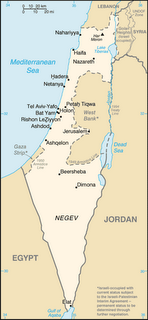Israel-Lebanon Crisis
Well, I wish I could say more about the war situation and I wish I the answers on how to solve this puzzle the West calls the Middle East. I've had several heated discussions and debates with friends, classmates and roommates. There are a lot of differing opinions here in Israel, it would be wrong for me to say there is a consensus. I think the conversation I had the other night with my friend Arik probably sticks out the most in my mind. Arik is 28 years old, he served 4 years in the military (is on reserve) and he travelled for 2 years. His grandparents are from Germany, they survived the Holocaust, although many of his great aunts and uncles perished. After I criticized Israel for their institutional discrimination against Arab-Israelis and their policies over Palestinian issues, he put it very bluntly, "Look, first Jews. First we have to take care of the Jews, and as soon as we can be sure that Israel is not in danger of being destroyed, and as soon as we can be sure there will not be another Holocaust, we can take care of others, including Palestinians." He compared the Arab threat against Israel to a person looking down the barrel of a gun being pointed at him by someone determined to shoot. He has all but two choices: either he kills the threat or he will die. Israel's military policy clearly reflects an "us or them" situation, among other things. Many have argued that the current campaign in Lebanon will not solve anything in the long run and will in fact make things worse. Which brings me to two questions: when a nation (any nation) knows nothing but death and war, can we still expect it to behave rationally? And secondly, will opposing Arab states and non-state radical Islamist groups ever recognize Israel's "right to exist" and therefore allow both parties to engage in civil discourse?
Today, I saw lots of gory pictures of the death and destruction in Qana, Lebanon. Tens of children gray, dusty, crushed, bloody and lifeless. Countless little bodies wrapped in plastic and tied... Again, I wish I had answers.








